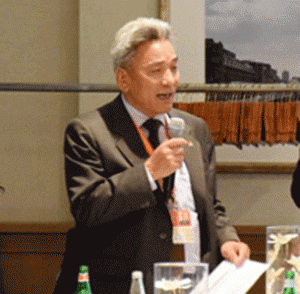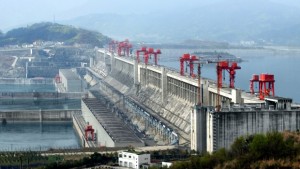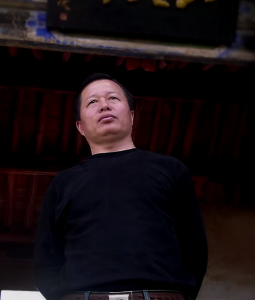2014-08-28

Kelsang Gyaltsen, special representative to Europe of the Dalai Lama, Continue reading
2014-08-28

Kelsang Gyaltsen, special representative to Europe of the Dalai Lama, Continue reading
Tibetan-Chinese Reconciliation an ‘Urgent, Historic’ Task: Exile Official By Richard Finney已关闭评论
Tagged Reconciliation, Tibetan-Chinese
August 28, 2014, 6:00 am

The Three Gorges Dam in China. Photo: Shutterstock
A self-confessed “accidental” reporter, Dai Qing has been making waves in Chinese media and society for more than three decades with fearless story-telling and outspoken opinions.
Her work opposing the Three Gorges Dam project in the 1980s and 90s (including the publication of her books Yangtze! Yangtze! and River Dragon Has Come) earned her international recognition, and her activism during this period also saw her imprisoned by Chinese authorities. While the tools have changed significantly over the decades, Dai Qing’s insights on investigative reporting from inside China, and the importance of press freedom, are as valuable as ever.
1.This year marks the 25th anniversary of your book Yangtze! Yangtze! on the controversial Three Gorges Dam project. How much has changed in China in these past 25 years when it comes to environmental awareness? Are investigative journalists holding officials and corporations accountable?
In the past 25 years, the environmental awareness of Chinese people has changed dramatically, especially among the educated who know how to use a VPN to cross the Great Firewall. There has also been great change for the residents whose living conditions and even lives have been threatened due to the deterioration of environment.
More and more investigative journalists make inquiries to officials who should be held accountable for the environmental destruction. However, officials have also improved their ability to evade these questions, by doing things such as seeking shelter from higher officials.
Dai Qing: ‘DON’T AIM AT FAME; JUST BE A GOOD, COMPASSIONATE PERSON’已关闭评论
Posted in Headlines
Tagged Dai Qing, Three Gorges Dam
2014-08-27

Ilham Tohti in Beijing, August 2012. Continue reading
Pretrial Hearing Scheduled For Detained Uyghur Scholar Tohti已关闭评论
Tagged Ilham Tohti, Scholar, Uyghur
By IAN JOHNSONAUG. 20, 2014
The documentary filmmaker Jocelyn Ford, left, and Zanta. Credit Sim Chi Yin for The New York Times
BEIJING — When the Tibetan farmer Zanta’s husband died, she was forced by local custom to move in with her in-laws, who forbade her son to attend school. Instead, she packed up and moved to Beijing, where she was helped by a relative from another lifetime.
That is the beginning of “Nowhere to Call Home,” a documentary by a foreign correspondent in Beijing, Jocelyn Ford, showing at the Museum of Modern Art this month. The film follows Zanta (who, like many Tibetans, goes by one name) here and in her hometown, where she confronts her father-in-law. Along the way, it becomes clear that the relative from another lifetime is Ms. Ford, who breaks the traditional wall between journalist and subject by becoming a friend.
The film breaks down the sometimes romantic Shangri-La view that Westerners have of Tibet, showing it to be a place with many hidebound traditions, especially discrimination against women. It also offers a shocking portrait of the outright racism that Zanta and other Tibetans face in Chinese parts of the country. And it shows how many members of minorities lack even basic education: Zanta’s sisters are illiterate, unable to count their change in the market or recognize the numbers on a cellphone. But maybe most surprising is that Ms. Ford has been quietly showing the film in China itself, eliciting admiration and unease that such a penetrating film was made by a foreigner.
For detail please visit here
Inspiring Dialogue, Not Dissent, in China-‘Nowhere to Call Home’ Examines Prejudices已关闭评论
Tagged Dissent, Jocelyn Ford, Tibetan
Posted 11:00am Wed Aug 27th, 2014 by heather budimulia
Viewing a country through an author’s lens is one of the best ways to understand a country or culture. But with millions of books on the market, Continue reading
As China’s “ultra-tough, unconventional” crackdown on terrorism continues to intensify in Xinjiang Uyghur Autonomous Region, Continue reading
LEC ASH 08.26.14
Chongqing Publishing Group
In 1902, Lu Xun translated Jules Verne’s !–more–>From the Earth to the Moon into Chinese from the Japanese edition. Science fiction, he wrote in the preface, was “as rare as unicorn horns, which shows in a way the intellectual poverty of our time.” Not any more. The Three-Body Trilogy by Liu Cixin has sold 500,000 copies in China since the first volume was published in 2006 (it will come out in English in the autumn). Liu, an engineer, is one of the so-called “three generals” of contemporary Chinese science fiction, along with Wang Jinkang and Han Song.
“Sci fi,” Han says, “can express a lot that can’t be expressed in other literature.” His most recent collection of stories, High Speed Rail, begins with a train crash that recalls the politically sensitive rail collision in Wenzhou in July 2011. In an earlier novella, Taiwan Drifts, Taiwan has broken free from its moorings and is on a literal collision course with the mainland. Unsurprisingly, much of Han’s work isn’t published in the People’s Republic.
Nor is The Fat Years (2009) by Chan Koonchung. Set in 2013, it depicts an “age of Chinese ascendancy” following a massive global financial crash. But the month-long crackdown that launched the golden era is missing from the population’s collective memory, and the water supply is probably spiked with a drug to keep everyone mildly euphoric. “The people fear chaos more than they fear dictatorship,” a high-ranking Party official says.
Healthy Words-Science Fiction from China已关闭评论
Posted in Culture
Tagged Healthy, Science Fiction, Words
August 20, 2014

An account of Gao Zhisheng’s decade-long government persecution.
Photo via Youtube user: TranscendingFearFilm Continue reading
Tienchi Martin-Liao:Lost in a Jungle of Injustice已关闭评论
Posted in Headlines, Human Rights Lawyer, Tienchi Martin-Liao
Tagged Gao Zhisheng, Human Rights Lawyer, Tienchi Martin-Liao